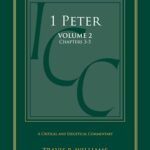Is the Promised Land a Type of New Creation?
Hebrews says “yes.” But, I’m not yet sure this means Christian Jews (Israel) won’t have their own special zip code in the new creation. That’s a possible inference from Hebrews, but it’s not clearly a necessary one. Quite a lot, of course, depends on what is meant by “type” and I’m going to happily pass by that discussion presently. (For a nice survey, see Ribbens’s article here.) What I want to do here is give six reasons from Heb 3–4 why we must not equate God’s land promise to Abraham (Gen 12:1–3 et al.)—the promised land—with the eschatological rest (qua new creation) to which it points. So, however we understand Israel’s land promise, we must at least take on board the following observations.
(1) If the promised land was equivalent with God’s eschatological rest, then the author of Hebrews wouldn’t have said that Joshua didn’t give Israel rest (Heb 4:8). In this verse, the author wants to make sure that his audience doesn’t draw the wrong conclusion from the analogy of the wilderness generation (see, e.g., Heb 3:7–19; 4:6–11). That is, he wants to make sure that his audience realizes that even if the wilderness generation obeyed, the promised land they would have received would still have only pointed to something greater, namely, to God’s eschatological rest. So, by introducing Joshua and the conquest, the author is saying that even the remnant that entered under Joshua and conquered the land (see, esp., Josh 21:43–45) didn’t experience the ultimate rest.
(2) If the promised land was equivalent with God’s eschatological rest, then how can Hebrews say that “a Sabbath rest remains for the people of God” in Heb 4:9 or that “those who believe enter rest” in Heb 4:3? That is, since the people promised rest is larger than and, thus, not equivalent to Israel, then this rest as well seems to be something larger than and, thus, not equivalent to the promised land. To put it another way: the category of recipients—God’s new humanity—seems to imply that the land promise pointed beyond itself to something greater and, moreover, that it wasn’t ultimately made to Israel alone.
(3) If the promised land was equivalent with God’s eschatological rest, then how can Hebrews say that believers are “entering” (εἰσερχόμεθα) this rest without any indication that what is entered is the land promised to Abraham? In fact, later the author will say that what believers—Jews and Gentiles alike—enter is something called the “heavenly Jerusalem” (12:22). True “heavenly Jerusalem” is a lot closer to God’s promise to Abraham than, say, “heavenly Chicago” but it’s nevertheless still heavenly and it’s a place where, as we’ve noted, all of God’s people will dwell (4:3, 9; also 12:23).
(4) If the promised land was equivalent with God’s eschatological rest, then how can Hebrews say that rest preceded God’s promise to Abraham? In fact, according to the author’s reading of Gen 2:2 (Heb 4:3–5), God’s rest has been around since creation. The author suggests that God rested after completing creation and that he’s been working, especially since the Fall, to bring humanity to enjoy this rest with him. (On this, see also the Adam-typology of Heb 2:5–9). If, moreover, rest is associated with the goal of creation and, post-Fall, new creation, then it’s no surprise that its recipients include all the people of God and not simply Israel.
(5) If the promised land was equivalent with God’s eschatological rest, then how can Heb 3:7–11, via Ps 95:7–11, associate rest with something different from or, at the very least, more specific than the promised land? David implies in the psalm that entrance into God’s presence can be described as an experience of rest (see Ps 95:2, 6), which seems to suggest that the promised land’s significance was less its territorial boundaries than its being the place where God manifested his presence, which is precisely what gives the new creation its significance (see, e.g., Rev 21:1–4).
(6) If the promised land was equivalent with God’s eschatological rest, then its function would be slightly different than the function the author of Hebrews assigns to Israel’s other institutions. The author insists, for example, that Israel’s sanctuary, priesthood and sacrifices pointed to something beyond themselves (see, esp., 8:5 and 10:1–4). Moreover, 12:22 suggests we could probably say that same thing about Jerusalem (see also 11:10, 16; 13:14) and 11:10–16 implies something similar about the land itself.


